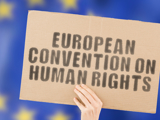The Relationship Between the Human Rights Act and the European Convention on Human Rights
Against the backdrop of the last year which saw the UK Government’s attempt to repeal the Human Rights Act (“HRA”) via the Rights Removal Bill (which you can read more about here) and the regular speculation on political and media commentary about possibly leaving the ECHR, it is important to understand the relationship between these two legal instruments. This blog post will first explore the ECHR and HRA in isolation before examining the importance of that relationship for our human rights in practice.
What is the ECHR?
Following the atrocities of World War II, countries were united in their mission to ensure governments-of-the-day would never again be able to pick and choose who gets rights and who doesn’t. In 1949, 10 countries (including the UK), agreed the Treaty of London which created the Council of Europe – an international organisation “convinced that the pursuit of peace based upon justice and international co-operation is vital for the preservation of human society and civilisation”.
The Council of Europe then created the ECHR, which the UK helped to write. Since then, 46 Member States (including the UK) have signed up to it. It is important to note that the ECHR has nothing to do with the European Union (“EU”). Therefore, Brexit did not impact the UK’s membership of the Council of Europe or the ECHR in any way. You can read more about the distinction between the Council of Europe and the EU in our explainer here.
In signing up to the ECHR, Member States promise to respect, protect and fulfil the human rights it sets out. These include the right to life, the right to liberty and the right to a fair trial. There are also additional “Protocols” to the Convention that have been developed over time. Member States can pick and choose which of these Protocols they want to sign up to. This explainer goes into more detail on the rights protected by the Articles of and Protocols to the Convention.
Individuals, groups or other Member States can bring a case to the European Court of Human Rights (“ECtHR”) in Strasbourg if a Member State breaches one or more of their Convention rights. The ECtHR consists of one judge from each Member State (but judges do not represent their state, they are independent).
Article 46 of the ECHR puts an obligation on Member States to action judgments from the European Court of Human Rights, but it is up to the State to decide how best to do this. In the UK it is not automatically assumed that our laws will change after an ECtHR judgment because we have the principle of parliamentary sovereignty. This means that the UK parliament will determine whether any current laws need to be changed or new laws need to be passed. For example, the Mental Capacity Act and Deprivation of Liberty Safeguards were passed following a ECtHR judgment against the UK (HL v UK, also known as the Bournewood case) as we did not have laws to protect the human rights to liberty and autonomy for people with mental capacity issues who have been detained for health and care reasons.
What is the Human Rights Act?
When introduced in 1998, the stated aim of the HRA was to “bring rights home”. The Act brings 16 rights that come from the ECHR into domestic UK law. The HRA itself was enacted to satisfy the obligations in Article 1 (that states will secure everyone’s rights) and Article 13 of the ECHR (the right to an effective remedy). These rights are therefore not listed separately within the HRA because they’re said to be met by the existence of the Act.
The HRA achieved its aim of bringing rights home by enabling individuals whose rights have been breached to take a case to a court in the UK, rather than having to go to the ECtHR in Strasbourg.
Section 2 of the HRA requires UK courts to “take into account” decisions made by the ECtHR when faced with questions involving Convention rights. While Section 3 of the HRA requires UK courts to interpret all domestic legislation in a manner compatible with Convention rights.
You can read more about the Human Rights Act and duties here.
HRA and Devolution
The HRA applies across the UK. The rights within the Act, brought into UK law from the ECHR, are interwoven into the devolution arrangements in Northern Ireland, Scotland and Wales. The Scotland Act 1998, the Wales Act 1998 and the Northern Ireland Act 1998 prevent the parliaments/assemblies in devolved nations from passing laws which may be incompatible with Convention rights, as set out in the Human Rights Act.
What if we only had the ECHR to protect our rights, not the HRA?
As the Rights Removal Bill made its way through Parliament (before being officially scrapped in June 2023), the question of how the rights of people in the UK would be protected in the absence of the HRA was brought into sharp focus. The question remains relevant in light of moves to disapply section 3 of the HRA through the Illegal Migration Act and the Victims and Prisoners Bill, and the overall piecemeal approach to dismantling the HRA that the current UK Government appears to have adopted.
Without the HRA, the only way for people in the UK to hold Government to account when their rights have been breached would be by taking a case to the ECtHR in Strasbourg. This is very time consuming and expensive, both for the individuals taking cases, and for the State.
But the HRA does not just enable people to take cases in domestic courts when their rights have been infringed. It provides them with a tool to advocate for more rights respecting decisions to be made about their lives, for example, in relation to their treatment in mental health and other social care settings, or their entitlement to benefits. The HRA can be used to prevent breaches of human rights ever happening in the first place, and to better conditions for people going forward, without the need to take a case to court.
What if we only had the HRA to protect our rights, not the ECHR?
While the current Government’s most recent manifesto (the promises the party made before winning the last General Election) does not mention the ECHR, the Government has discussed the possibility of withdrawing from the Convention as reported in the media, with increasing frequency in 2023. In 2022, the ECtHR prevented the UK government from deporting asylum seekers to Rwanda. This was met with further suggestions that withdrawal from the ECHR may be on the cards in the future.
In light of this negative discussion around the ECHR, it is useful to set out how the HRA would operate if the UK was no longer a signatory of the Convention.
At the outset, it is important to explain that the HRA stands independently of the UK’s membership of the ECHR and the Council of Europe, because it is a UK law passed by our parliament. As such, the HRA would not automatically be repealed if the UK were to withdraw from the ECHR. However, there would be several other consequences.
Firstly, if an individual did not secure the human rights protection they sought from the UK courts they would no longer be able to take their case to the ECtHR. This would limit Government accountability and make it harder for people to ensure their human rights are respected, protected, and fulfilled.
Secondly, we would not benefit from the application of interim measures of the ECtHR if the UK withdrew from the Convention. Interim measures are orders issued by the ECtHR where there is an imminent risk of irreparable damage during the (often very long) time between when a case is taken and when it is heard. The measures are intended to stop or reduce the likelihood of this damage to a person’s human rights. While interim measures are not written into the ECHR, they’re written in the European Court of Human Rights’ Rules of Court. When the UK signed up to the ECHR, it agreed to follow these rules to make sure the Court could function as intended. You can read more about what interim measures are here. These kinds of measures have been in the news lately because they were used in a recent case brought by people seeking asylum when the UK Government attempted to send them to Rwanda. You can read more about the Rwanda case and the important role the ECtHR played in upholding the rights of asylum seekers in that case here. They were also recently issued to protect British citizens who had gone to the Ukraine and were captured and threatened with the death penalty from Russia.
Thirdly, withdrawing from the ECHR would breach the Belfast/ Good Friday Agreement (“GFA”). The GFA requires that the ECHR be capable of direct enforcement in Northern Ireland and this would not be possible if the UK were to leave the Convention. A breach of this kind would pose a serious threat to the peace settlement in Northern Ireland.
Finally, leaving the ECHR would have broader implications for international relations and the UK’s global reputation as a country committed to human rights protections. For example, Baroness Prashar has pointed out that while the EU and the UK currently work together to prevent and prosecute crimes and protect public securities, the European Union are allowed to terminate this agreement if the UK fails to respect the human rights treaties both parties are currently signed up to (like the ECHR).
Only two countries have left the ECHR to date: Greece in 1967 while under a military regime accused of mental and physical torture (it later rejoined in 1974 once democracy was restored), and Russia after invading Ukraine in 2022. If the UK were to join Russia in abandoning Convention membership, its ability to scrutinise and criticise human rights abuses abroad would greatly diminish. It would further risk setting a precedent for other countries to leave, resulting in lesser human rights protections for millions of people across Europe, and further afield.
Related topics
Find out more about human rights law.
Stay up-to-date
Get our newsletter
Get monthly updates on UK human rights law and our work, resources and events sent straight to your inbox.



